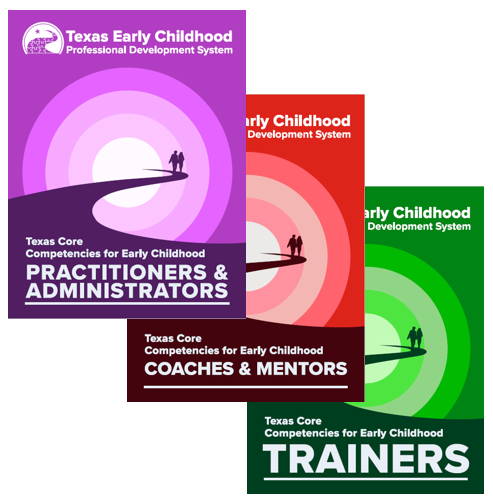Core competencies are the foundation of a professional development system.
Core competencies refer to specific, basic concepts, skills, and abilities that early childhood professionals should learn, understand and be able to demonstrate. In Texas, we have developed core competencies for the following groups: Practitioners, Administrators, trainers, and coaches/mentors, with the intent of providing guidance to professionals seeking training and for trainers seeking training topics.
Demonstrating ability and excellence in any profession requires the mastery of different competencies related to the job. There are concepts, practices, and knowledge that early childhood practitioners and administrators must know and be able to demonstrate in order to be effective in facilitating children’s growth and development. Below you will find a list of the Core Competency Areas pertaining to each group. For a complete list of the observable competencies that fall under each area, please download the full Core Competencies documents.
Learn More about the Core Competencies
The content and structure of the competencies can be thought of as a framework for assessing knowledge and skills, guiding training and professional development opportunities, and monitoring progress. Through CLI Engage, early childhood professionals can learn about the Texas Core Competencies for Early Childhood Administrators and Practitioners. This training was designed for use by early childhood professionals to improve the quality of care and education young children receive.
Visit CLI Engage to Access the Core Competencies Training Modules
Texas Core Competency Areas
Download the Core Competencies Documents

- Texas Core Competencies for Early Childhood Practitioners and Administrators
- Core Competencies for Trainers
- Core Competencies for Coaches and Mentors
Core Competencies Alignment to NAEYC
TECPDS recently completed an alignment of the Texas Early Childhood Core Competencies for Practitioners to the National Association for the Education of Young Children’s Professional Standards and Competencies for Early Childhood Educators.
